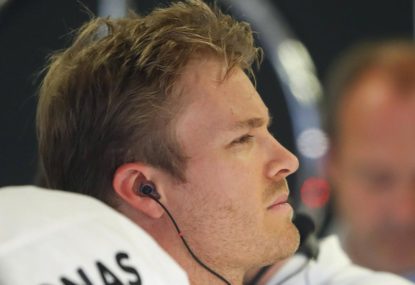'Welcome back': Reliving the last Chinese Grand Prix ahead of its much-anticipated return five years later
Five-years is a long time in motorsport, let alone the general state of the world – especially given the impact of the Covid-19 pandemic…

Like it or not, the question of validity will be posed on Monday morning after Formula One’s longest-ever season decides a champion.
Would a Lewis Hamilton championship be fair should disaster befall his teammate in the season-ending race, as must almost certainly happen for him to claim his fourth crown?
Or will Nico Rosberg be deserving of the championship, given Hamilton’s late-season engine failure in Malaysia and subsequent psychological collapse?
Hamilton has long been on the offensive in this regard, and his not-at-all-subtle Rosberg-directed barbs in Brazil attempted to set this weekend’s tone.
“Nico’s driving at his best right now, and today he had nothing on me,” the Briton said, before re-emphasising his belief that only unreliability has prevented him from tying up the title.
Rosberg has been inert to the pressure for almost the entire season, staying true to his one-race-at-a-time mantra.
Whatever the outcome, neither driver will escape Sunday’s race mud free.
But what if neither (or perhaps both) are right? Will either be truly deserving? Is there even such a thing as a deserving world champion?
If you want to talk about some of F1’s all-time legendary moments, it’s hard to mount such an argument.
Championships have been coloured by team orders. In 1956, F1 icon Juan Manuel Fangio famously won his fourth of five titles when one of his Ferrari teammates, Peter Collins, was ordered to surrender his own shot at the championship by swapping cars with the Argentinian.
Injury, too, has played a part in the deciding of key seasons. Keke Rosberg – fitting that he would appear on this list – won the 1982 championship not just with a single win all season, but after title rival Didier Pironi broke his legs in the fifth-last round, ruling him out of the rest of the year.
Likewise, who can forget the dramatic 1976 season, in which James Hunt famously won his sole championship – but only after Niki Lauda’s fiery crash at the German Grand Prix ruled him out of the following two races?
But perhaps the most questionable results came about under one of the sport’s most questionable rules.
In 1964, Graham Hill was robbed of a championship due to the ‘dropped points’ regulation: Hill scored 41 points to John Surtees’ 40, but because only a driver’s best six results counted towards the title, he would wind up behind his compatriot by a single point.
The story was much the same for – whisper it – Alain Prost, in his defeat at the hands of Ayrton Senna in 1988.
The Frenchman easily outscored F1’s most famous driver, 105 points to 94, but he was forced to drop 18 points to the Brazilian’s four and finished second in the standings.
Then, of course, there are the anomaly seasons. On his way to his only title, Jenson Button won six of the first seven races in 2009 – and that’s it. He finished on the podium just twice in the remaining ten rounds once rival teams caught up on the year’s trick aerodynamic part, the double diffuser.
Four years later, Sebastian Vettel stormed to his 2013 championship with nine wins from ten races after Pirelli changed its tyre construction at the Hungarian Grand Prix following widespread abuse of the stock rubber by the teams, Red Bull Racing included.
And for the truly ambiguous titles, look no further than Michael Schumacher’s 1994 triumph, recorded after a ‘racing incident’ that forced championship rival Damon Hill into retirement. It would prove remarkably similar to the move he tried to pull on Jacques Villeneuve in an attempt to deprive the Canadian of his 1997 championship – but that year Schumacher was disqualified for his efforts.
Are any of these decorated world champions somehow lesser for the circumstances in which they won their titles? Has James Hunt gone down as undeserving, Juan Manuel Fangio as anything other than perhaps the sport’s best driver, or Ayrton Senna as a mere conjuring of a regulatory quirk? Certainly not.
Sure, Hamilton’s grip on this championship slipped, perhaps ultimately, after an engine failure – much as Rosberg’s did in 2014 when his electrics failed in Singapore and ERS failed at the season finale, neither of which is held against Hamilton’s career triple.
These are the vagaries of racing. The only certainty in F1 is that the points don’t lie – even when the points are dropped – and the only kind of champion is the one who scores more points than his rivals, as will be the case this Sunday in Abu Dhabi.
So may the best driver win – whatever that means.
Follow Michael on Twitter @MichaelLamonato